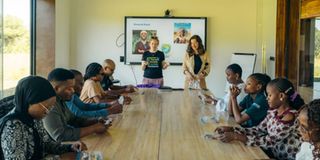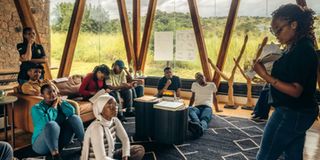Scientists urged to use simple language for inclusive conservation

Facilitators engage participants during a training session for environmental scientists on how to effectively communicate research in simplified language. The session, featuring a presentation about science communicator Ghaamid Abdulbasat, is part of a collaborative initiative by the Grumeti Fund and Leiden University (Netherlands).
Serengeti. Environmental scientists have been urged to adopt simplified and accessible communication methods when presenting their research findings, in a bid to foster inclusive and sustainable conservation efforts across communities.
The call was made on May 3, 2025, during a five-day training session on science storytelling organized by the Grumeti Fund in partnership with Leiden University of the Netherlands. The workshop brought together 10 environmental scientists from various institutions in Tanzania under the Research and Innovation for the Serengeti Ecosystem (RISE) Program.
Ghaamid Abdulbasat, a science communication expert and facilitator at the session, underscored the importance of breaking down scientific jargon to make research relatable and impactful. “For too long, scientists have communicated within their circles. To drive real change, we need to speak in ways that resonate with the public,” he said.
He stressed that clear, relatable language and storytelling can help influence policy and encourage community involvement in conservation efforts.

Janeth Mgure, one of the participants in a training session for environmental scientists, delivers a presentation on simplifying scientific research for broader audiences. The training, held in a serene natural setting, was organized by the Grumeti Fund in collaboration with Leiden University (Netherlands).
Participants were taken through various techniques for simplifying research findings, with a focus on using storytelling as a tool to make complex topics more digestible to non-expert audiences.
Janeth Mgure, a master’s student from the University of Dar es Salaam and co-founder of the Human-Wildlife Coexistence Foundation, admitted that academics often overlook the public’s ability to grasp scientific concepts. “Many of us use language that alienates the very people we seek to engage. This training has shown me the value of bridging that gap,” she said.
The training also highlighted the deep link between environmental issues and local livelihoods, especially in areas like the Serengeti where conservation is intertwined with community well-being.
Victoria Mkesa, RISE Program coordinator at Grumeti Fund, said the sessions were designed to build capacity among researchers to communicate effectively with the communities they serve. “We believe storytelling is a powerful tool to humanize science and make it relevant to everyday life,” she said.
Mkesa added that the initiative aims to ensure scientific findings do not remain confined within academic circles, but are instead translated into practical, community-driven action.
“When scientists present their work in a way that people can relate to, it strengthens the connection between research and reality, making conservation more inclusive and sustainable,” she concluded.



